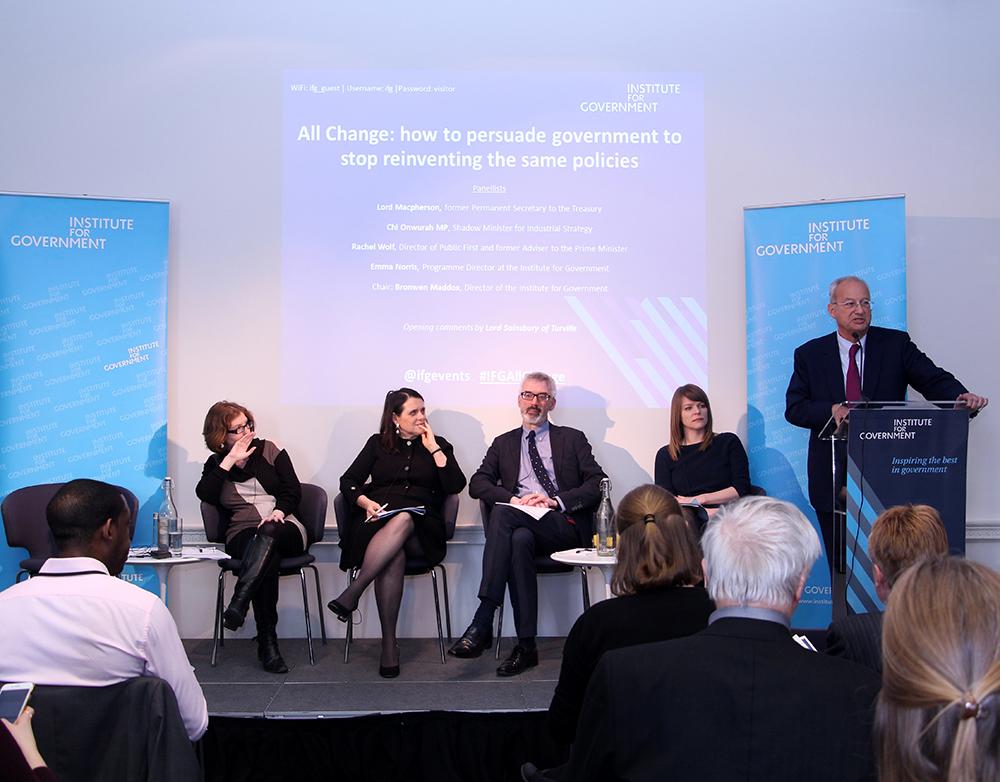Our All Change report lays bare the staggering amount of policy churn in three sectors: further education, regional government and industrial policy. At our report launch, panellists and the audience discussed the causes of churn in Whitehall, the implications for policymaking, and what can be done about it.
Government has a tendency to recreate policies and organisations on an alarmingly regular basis. In industry, we are onto our third industrial strategy in a decade. In regional and local government, there have been 59 attempts to join up local public services between 1997 and 2015. But nowhere is this tendency towards reinvention more acute than in the further education sector. Since the 1980s there have been 28 major pieces of legislation, 48 secretaries of state with relevant responsibilities, and no organisation has survived longer than a decade. There are now around 13,000 technical qualifications.
The costs of all this churn and reinvention are high. As Phil Collins, political columnist for The Times and former speechwriter for Prime Minister Tony Blair (2005–07), wrote in our report: “The vocational sector is an ‘alphabet soup’ of providers, with acronyms that change every year. Students are horribly confused about which programmes are valued by employers, and nobody has any confidence that a qualification will lead to work or pay progression, or even exist in a few years’ time.”

Government-by-announcement
During our research, we saw numerous examples of past initiatives being recycled or policies and organisations being abandoned before they had time to thrive. There is a tendency to start with first principles rather than draw on the past or focus on delivery. As Lord Macpherson, panellist and former Permanent Secretary to the Treasury, put it: “When you get power, you are under pressure to do something with it. Once you’re there, the chances are you’ll only be in job for few years before a reshuffle. This encourages government-by-announcement rather than government-by-delivery. There is a Year Zero effect where we start from scratch each time.”
This is particularly true of policy areas which are subject to a lower level of public scrutiny than others. For instance, debates about the size, shape and objectives of the further education sector tend to happen outside the spotlight of media attention. Contrast that with the scrutiny applied to reforms in the universities or schools system. Rachel Wolf, Director of Public First and former Adviser to the Prime Minister, told us: “it is tough being a junior minister in an area that is below the first tier of attention – and one of the few ways to get noticed is to announce things.”
Skills or knowledge
In this report, and in previous research, the IfG highlights the importance of keeping civil servants in post for longer periods of time, to enable them to build the knowledge and networks that support effective policymaking. This tension between the incentives in Whitehall, which are often to move roles relatively quickly (as Rachel Wolf says, there is “panic at the idea you stay in post for longer than 18 months”) and the need for deeper, more specialist knowledge as part of an effective policy process, came out again at the launch event. As Lord Macpherson outlines: “it is to do with incentives and leadership. Government has to answer the question of how much it values expertise in government and incentivise people to stay in post longer.”
The need for a deeper appreciation of history in the policymaking process was also emphasised during the event. While this has started to take hold in the Treasury, and the Cabinet Office are currently exploring the opportunities digital technologies provide for better capture of past research and initiatives, there remains more to do.
“You can’t shut out politics”
Our panellists recognise the negative consequences of churn. But Chi Onwurah MP, Shadow Minister for Industrial Strategy, provided the challenge that “change is also part of democracy.” Often, policy reform or reinvention is driven by the fact that people have voted for change. The challenge, then, is allowing for that – but also supporting a policymaking process that is more resilient and enduring. This question of how to make policy stick is one the IfG has examined before.
Recommendations
The crux of the problem is how to allow for necessary political change, while ensuring the policymaking process and broader Whitehall system is best configured to deliver policies rather than continually reinventing them. Our report recommends the following:
- departments use tools (such as digital records) to better capture what they already know, instead of starting from scratch on every new policy idea
- clear lines of accountability, making the senior civil servant in charge of policymaking in each department responsible for maintaining institutional memory
- making it standard practice to gather evidence, including of previous reforms, as part of the development of new policy proposals
- greater scrutiny by select committees, requiring government to include a statement on the evidence behind policy decisions as a routine part of enquires
- a greater role for the Treasury in assessing the costs of organisational change
- incentivising civil servants to build expertise and spend longer periods in post, rather than promoting very regular change.
Read the full report – All Change: Why Britain is so prone to policy reinvention, and what can be done about it
Watch or listen to the report launch – All Change: how to persuade government to stop reinventing the same policies
- Supporting document
- Making Policy Better.pdf (PDF, 881.76 KB) IfG_All_change_report_FINAL.pdf (PDF, 839.73 KB)
- Topic
- Policy making